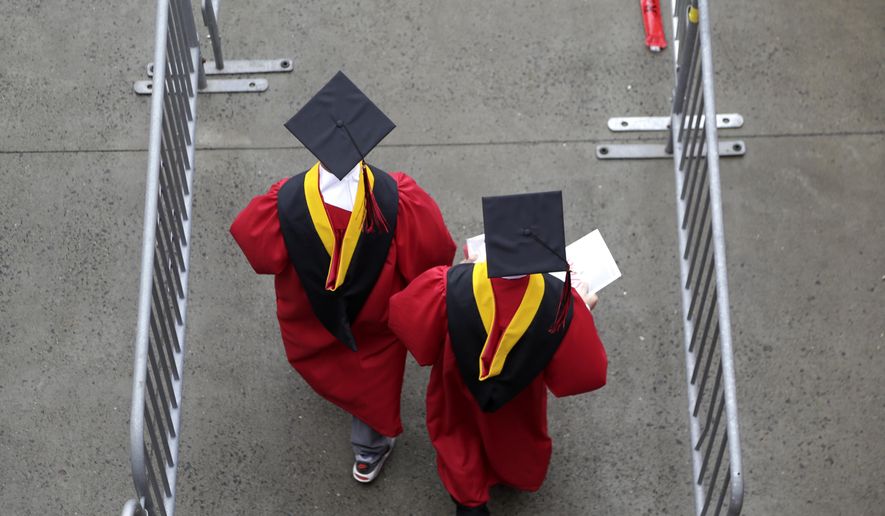The Department of Education has finalized plans to cap federal student aid for graduate degrees and restrict who qualifies for public-service loan forgiveness.
The regulatory changes, which the White House Office of Management and Budget must approve, seek to implement provisions of the budget-reconciliation bill that President Trump signed last summer.
The federal agency has proposed limiting graduate student borrowing to $20,500 annually for nonprofessional master’s and doctoral degrees and $50,000 annually for professional degrees. That works out to aggregate caps of $100,000 and $200,000, respectively.
“This will benefit borrowers who will no longer be pushed into insurmountable debt to finance degrees that do not pay off,” Under Secretary of Education Nicholas Kent said Thursday in a statement.
Beginning July 1, the proposed rules would end a 20-year-old program that allowed unlimited borrowing for graduate degrees to cover full tuition. They would also reduce the number of nonprofit and government employees qualifying for the federal Public Service Loan Forgiveness program.
The Obama and Biden administrations expanded the definition of “public service” beyond government employees to include community organizers and social workers.
Under the new rules, student loan recipients who work with unauthorized immigrants or provide transgender medical services to minors will no longer qualify.
The Education Department said the proposal would also “sunset the confusing maze of student loan repayment plans created by the Obama and Biden Administrations, and create a new and simplified Repayment Assistance Plan.”
The Washington Times has reached out to the White House and the Office of Management and Budget for comment.
The Trump administration previously announced plans to eliminate federal student aid for low-performing undergraduate humanities programs that cannot prove their graduates earn more than the average high school graduate.
Higher education sources reached for comment said the caps announced on Thursday could further discourage students from pursuing master’s degrees in English, history and anthropology.
“College cost and college debt are real problems, but a cap on borrowing is exactly the wrong solution,” said Jonathan Zimmerman, a professor in the history of education at the University of Pennsylvania, in an email on Friday. “It will lead some students to take on even more debt via private, high-interest loans. And it will block others from pursuing graduate education in the first place.”
The nonprofit College Board estimates that the federal government awarded $275.1 billion in grants, tax credits, work-study programs and low-interest student loans for the 2024-25 academic year.
That includes an average taxpayer-subsidized aid package of $16,810 per undergraduate student and $29,160 per graduate student.
The Education Department said its 17 proposed changes to borrowing regulations followed two rounds of negotiations with university administrators and higher education advocates.
According to the proposed definition of “professional degrees,” roughly 44 graduate programs will qualify for the higher borrowing caps because they require skills beyond those needed to receive a bachelor’s degree.
They include degrees in medicine, law, dentistry, veterinary medicine, clinical psychology and theology. Doctoral programs could also count as professional if they require at least six years of college coursework.
The Education Department’s Mr. Kent said the changes will “simplify our complex student loan repayment system and better align higher education with workforce needs.”
Dick Startz, an economist at the University of California, Santa Barbara, said the rules could also make it harder for some teachers and medical workers to pay off their school debt.
“The majority of teachers and three-quarters of doctors take graduate student loans,” Mr. Startz said Friday. “Do we really want to cut back on loan support for teachers and doctors?”
But Peter Wood, president of the conservative National Association of Scholars, called the Education Department rules a “long overdue” response to universities taking advantage of easy loans for “virtually useless” master’s degrees in the humanities.
“The overproduction of graduate credentials to take advantage of easy federal loan terms has been an open scandal for years,” said Mr. Wood, a former associate provost at Boston University. “For the most part, we’re talking about degrees that have little applicability to jobs in anything other than academia, and more than one generation of graduate students has fallen into untenable debt pursuing them.”
• Sean Salai can be reached at ssalai@washingtontimes.com.




Please read our comment policy before commenting.